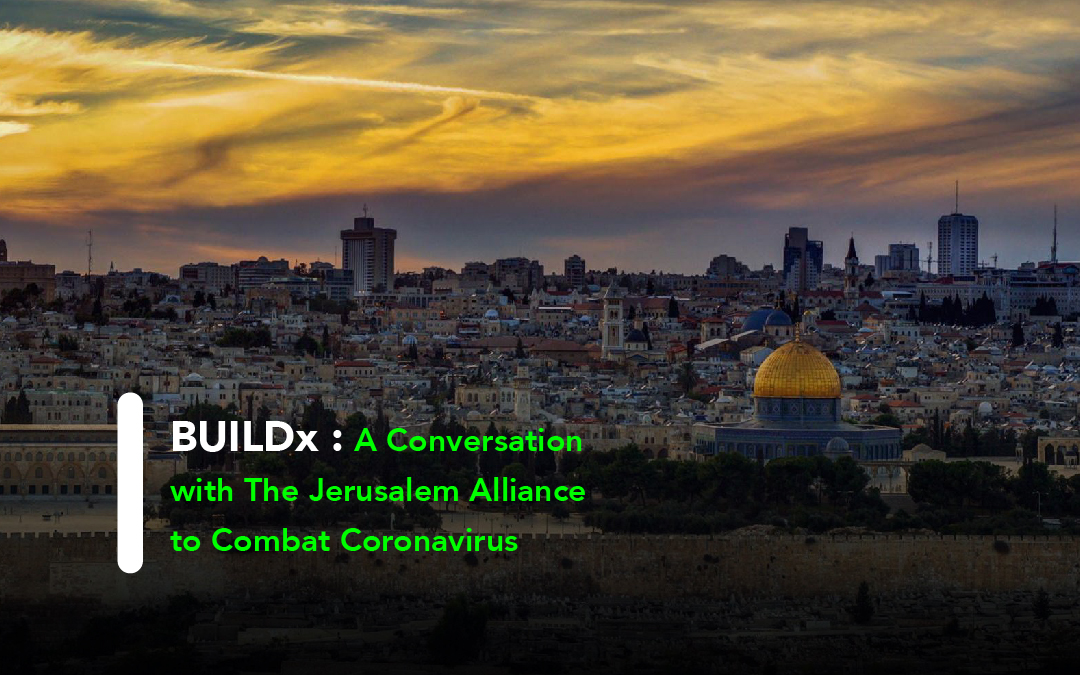For our Second BUILDx event, we shed light on the situation in East Jerusalem during the Coronavirus pandemic. We hosted Ahmad Budairi from the “Jerusalem Alliance to encounter the coronavirus” and Muntaser Dkedek – Executive director of Burj Alluqluq Social Center Society, currently a volunteer with the Jerusalem Alliance.
Muntaser began with “even though we are not able to go around, but Zoom, Facebook and such platforms are giving us the chance to reach people and letting them participate as well.”
When the pandemic started, there was little attention given to East Jerusalem. As a result, organizations, initiatives, and individuals in Jerusalem came together to form the Jerusalem Alliance. What started as 10 organizations is now 82 and counting. Social media alone won’t save us
During the early stages of their work, the Jerusalem Alliance was sharing brochures, and posts on Facebook to spread awareness about the novel Coronavirus. . But as the situation began to worsen for the people of Jerusalem, the alliance realized that more work was needed to alleviate the effects of the pandemic.
Only 40 beds
Supporting hospitals with the needed health supplies, recruiting volunteers, connecting with the WHO and UN for more support. As the fact that there are only 40 beds for Coronavirus patients, which is far from being sufficient.
Accomplishments
So far, the alliance has been able to offer psychological care to everyone who is quarantined in the hotel. Sanitizing all the associations, health centres and hospitals. They also built 7 to 8 triaging tents, for everyone to get tested there before entering the hospital, one of the tents was made in the French hospital parking, and thanks to Dr. Nael Tibi he helped a lot. They also created a call centre to deal with people’s needs. The alliance was able to reach the Jerusalem audience through Facebook pages.
We are wondering, how did you manage working with this big number and how are the tasks distributed among everyone?
“We worked through two frameworks, first one is through the people and the second is through the institutions. For the institutions, one of the best things that happened is that all the institutions are aware that an individual effort is less efficient and is not comparable to group work. Educational, cultural, youth, Women, Children, physiological, cultural and social support
All the coordination between us has been done through WhatsApp, it has made everything easier, from transmission all the news to connecting us more with the volunteers.”
What about the financial part?
“From the beginning we did not ask for any money, we know how the situation affects everyone in this county, so we did not go to the people to ask for donations”. The alliance instead reached out to the private sector for donations to help them in their current operations.
“It’s our duty to help people, even with the minimum capacity.
Muntaser Dkedek indicated that they are currently taking care of 60 quarantined students. On a daily basis, they have doctors and paramedics, as well as 12 volunteers that are there to fulfil their personal, psychological and day to day needs.
In general, most of their needs are manageable, but when we can’t, we ask them to ask their parents to bring what they need.
For the packages that the families or any others send, we accept them from 2 to 3pm, where now in Ramadan we accept till 6:30pm, then we try to finish sanitizing them as fast as possible to give them to the students by Iftar.
Will you continue working in such framework in the future even after Corona? And how do you find the work atmosphere?
While Ahmad’s answer was no as, “The only reason that pushed us to form the Alliance is the outbreak of COVID-19. As soon as it goes away, there won’t be a need for our efforts. ”. Mustanser on the other hand believes that the Alliance will continue to operate post-pandemic to continue supporting the people of Jerusalem.
Last words…
Everyone should have the chance to give help but only if they use the right way and right tools. All the volunteers should be thanked and honoured.
—
Nahla Wihaidi is a BuildPalestine volunteer, and a holder of a Bachelor’s degree in “Translation: German, English, Arabic” from the German Jordanian University. Having interned in Germany at “Frauen in Arbeit” which translates to “Women in Business”, Nahla is very passionate about feminism and women’s rights, as well as helping refugees from all around the world.

